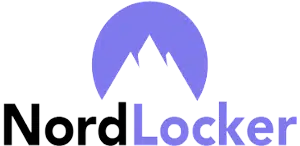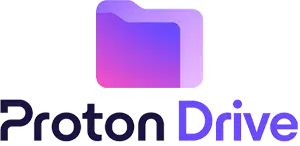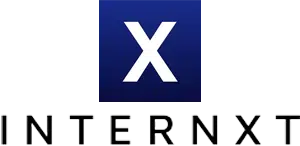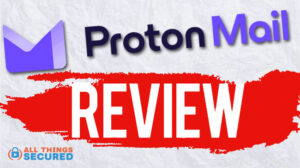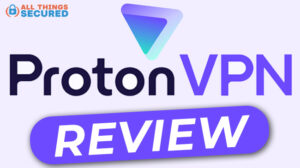According to a 2024 IBM report, 82% of data breaches involved cloud-stored data. This could spell serious disaster for our digital lives, especially when you consider that the most popular cloud storage options aren’t end-to-end encrypted. If you’re looking to find out the most secure options, this list of the best encrypted cloud storage providers will answer your questions.
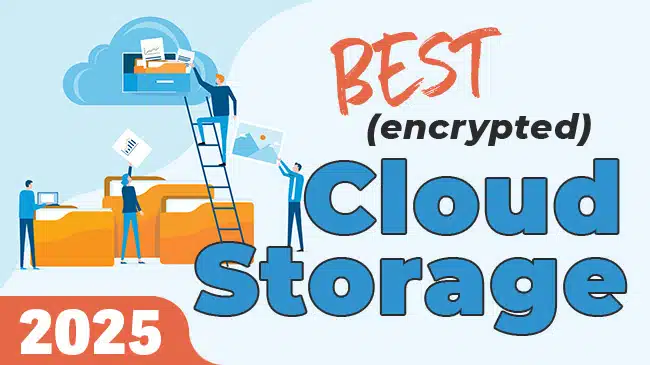
Though underutilized, encrypted cloud storage services have existed for a while. They offer a secure solution with encryption and seamless file storage, sync, and sharing.
Below, I’ve laid out the best options for cloud storage services in 2025, so you can keep your data secure.
Key Takeaways
- Encrypted cloud storage services offer significantly better security than traditional “free” options like Google Drive or Microsoft OneDrive, protecting your data with advanced encryption techniques.
- Top encrypted cloud storage providers in 2025 include Proton Drive, NordLocker, and Internxt, each offering unique features like zero-knowledge encryption, local file encryption, and decentralized storage.
- When choosing an encrypted cloud storage service, prioritize open-source platforms, company history, zero-knowledge encryption, and cross-platform accessibility.
- Some providers offer generous free tiers (up to 10 GB with pCloud and iDrive) or lifetime plans (Internxt), making secure cloud storage accessible and cost-effective.
Top 3 Encrypted Cloud Storage Services
Imagine entrusting your most personal data to a stranger who promises to keep it safe for free. That’s essentially what you’re doing with Google and Microsoft’s “free” cloud storage. Sure, it’s convenient, but at what cost?
Your privacy. Your data. Your digital identity.
But you’re smarter than that. You’re here because you know there’s a better way. An encrypted cloud storage is just that- a high-security vault. It’s time to upgrade from a cardboard box to a steel safe.
Note: Some of the links in this article may be affiliate links, which means that at no extra cost to you, I may be compensated if you choose to use one of the services listed. I only recommend what I personally have used, and I appreciate your support!
Key Features of an Encrypted Cloud Storage Service
Let’s get into some basic factors you will want consider when selecting an encrypted cloud storage provider.
- Prioritize an open-source platform. This means independent security audits, transparency, and trust in the service’s security measures.
- Consider a company’s history and stability. A provider with a proven track record and financial stability is less likely to abruptly cease operations, ensuring your data is in good hands.
- Look for zero-knowledge encryption. This fundamental technology ensures that only you can access your data, as the service provider never keeps your encryption keys.
- Lastly, consider the access you’ll have across multiple platforms. A robust service should offer seamless access via desktop apps, mobile apps, and web browsers, enabling secure file access from any device.
Best Encrypted Cloud Storage Reviewed and Compared
After testing many different options, I’ve created this curated list of what I consider the top encrypted cloud storage services available today. I’ve assessed each of them based on the key factors mentioned above, as well as additional criteria such as storage capacity vs. price, backup and recovery options, sharing and collaboration tools, and more.
Proton Drive | Recommended Provider
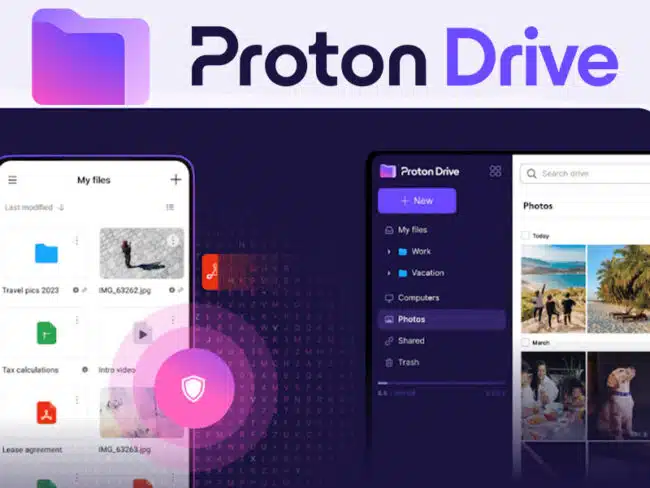
Launched in 2022 by CERN scientists, Proton Drive is the latest addition to the Proton suite of privacy-focused services. This open-source, publicly audited cloud storage solution benefits from strong Swiss data privacy laws and employs cutting-edge encryption technologies.
Security is at the core of all that Proton does, including Proton Drive. It utilizes zero-access encryption, OpenGPG standards, elliptic curve cryptography, and digital signatures to ensure that your data remains inaccessible to anyone, including Proton themselves.
Their drive service is part of a comprehensive ecosystem that includes Proton VPN, Proton Mail, Proton Calendar, and Proton Pass (password manager). Users who opt for the medium or higher tier plans (starting at €12.99/month for 500 GB or €29.99/month for 3 TB) gain access to the entire Proton suite at no extra cost.
For those looking to try the service, Proton Drive offers a free plan with 5 GB of storage. There’s also an intermediate 200 GB plan priced at €4.99 monthly.
Accessibility is also a key feature of Proton Drive. Users can access their files 24/7 via web browser or dedicated apps for Windows, macOS, iOS, and Android. The clean and user-friendly interface offers multiple themes, including a sleek dark mode.
Uploading files is as simple as drag-and-drop, with all data syncing across your Proton account for seamless access across devices. It also includes useful playback features for previewing various file types.
There are no file-sharing size limits, and you can share uploaded files securely with password protection or time limits. Additionally, it has several features that enhance collaboration, like version history and file activity logs.
While Proton Drive lacks chat support, it offers a broad search feature for troubleshooting common issues. In cases of more complex problems, you can reach out to the support team via a standard contact form.
Lastly, there’s a 30-day money-back guarantee on all paid plans to allow all users to try Proton Drive risk-free.
Proton Drive Pros
- Zero-knowledge architecture
- Unlimited local file encryption
- Free tier with 5 GB of space
- Intuitive drag-and-drop interface
Proton Drive Cons
- No file-sharing in the free tier
- File recovery is unavailable
NordLocker Encrypted Cloud Storage
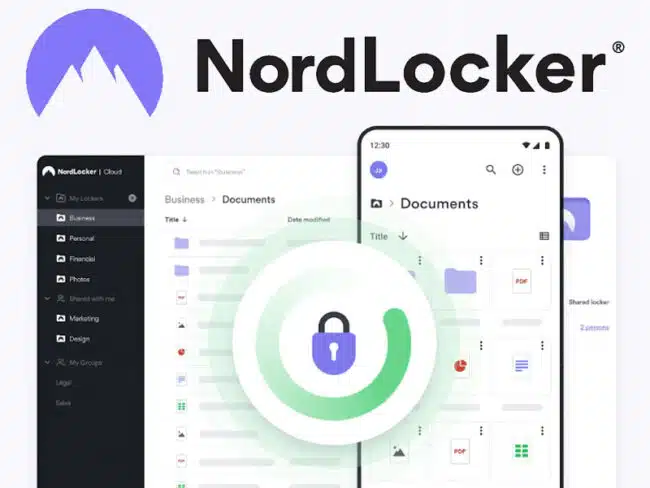
Launched in 2019, NordLocker is part of the Nord Security family, a Lithuanian company with a strong and reliable track record. Built on a zero-knowledge architecture, NordLocker ensures that your data remains inaccessible to outsiders.
Like many cloud storage services, NordLocker operates on a freemium model. However, its free plan offers only 3 GB of space and lacks file-sharing capabilities. To share files, users can upgrade to paid plans starting at $7.99/month for 500 GB or $19.99 for 2 TB.
Security is paramount with NordLocker. After sign-up, users receive both a master key and a recovery key. It’s crucial to store these keys safely to maintain account access.
NordLocker’s UI is consistent across Windows and macOS, mirroring the simplicity of NordVPN. File upload is as easy as drag-and-drop, and the automatic cloud backup feature, accessible through settings, adds an extra layer of convenience.
Another standout feature of NordLocker is its local file encryption capability. This allows users to create encrypted copies of files on their devices without uploading them to the cloud.
Mobile access is available through dedicated apps. However, their iOS version currently lacks some features such as file sharing.
Sharing options in NordLocker are flexible. Users can share folders via email (requiring the recipient to install NordLocker) or via link (allowing viewing without installation). However, recipients can only download local copies of shared files, as NordLocker doesn’t offer direct viewing or editing.
Moreover, one major drawback is the lack of file recovery features that are found in other competing services like Proton Drive and iDrive.
For troubleshooting and support, NordLocker does offer a comprehensive help center with guides and a support request system.
You can experience NordLocker risk-free with its 30-day money-back guarantee.
Nordlocker Pros
- Zero-knowledge architecture
- Unlimited local file encryption
- Free tier with 3 GB of space
- Intuitive drag-and-drop interface
Nordlocker Cons
- No file sharing on free tier
- File recovery is unavailalbe
Internxt Secure Cloud Drive
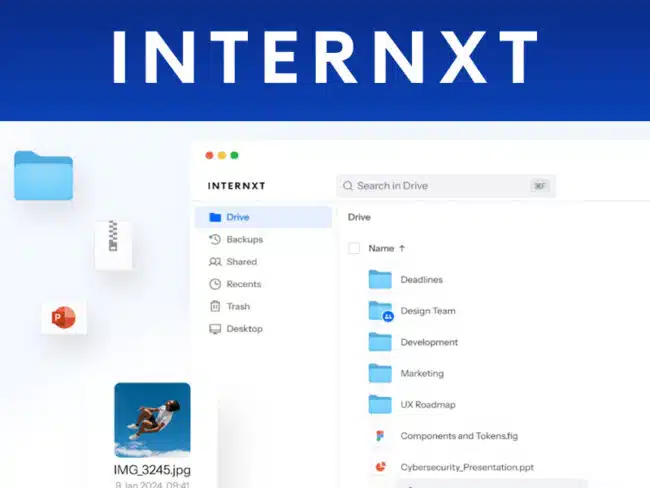
Internxt, a relative newcomer to the encrypted cloud storage space, was founded in Spain in 2020 and is based on blockchain technology. Its code is open-source and has been audited by the European security firm Securitum.
Internxt’s innovative security method involves fragmenting and encrypting files before distributing them across a decentralized network of servers. While this approach significantly enhances security, it can result in slower upload speeds.
Where Internxt truly shines is its competitive pricing, particularly its lifetime plans. These plans rival the cost of physical hard drives, starting at €180 for 2 TB, €380 for 5 TB, and €580 for 10 TB. This pricing structure outcompetes other providers like pCloud, whose lifetime plans start at $199 for 500 GB and reach $1,190 for 10 TB.
For those seeking low-commitment options, Internxt also offers individual plans starting at €1.00 for 200 GB to €6.00/monthly for 10 TB. While these paid plans are among the most affordable in the industry, its free plan is the weakest on this list, offering only 1 GB of space.
In terms of user experience, I found Internxt’s desktop and mobile apps to help sync, upload, and manage files. Security features include two-factor authentication with face ID support, and file sharing comes with password protection and customizable access levels.
Moreover, customer support is readily available through a live chat pop-up window on Internxt’s website.
To instill confidence in potential users, Internxt offers a 30-day money-back guarantee on all paid plans.
Internxt Pros
- Innovative security measures
- Affordable lifetime plans
- Advanced file-sharing options
- Multi-factor authentication
Internxt Cons
- Only 1 GB of storage on free tier
- Slower upload speeds
Get 70% off Internxt lifetime plans using the affiliate link above.
Sync.com | Best Secure File Sharing
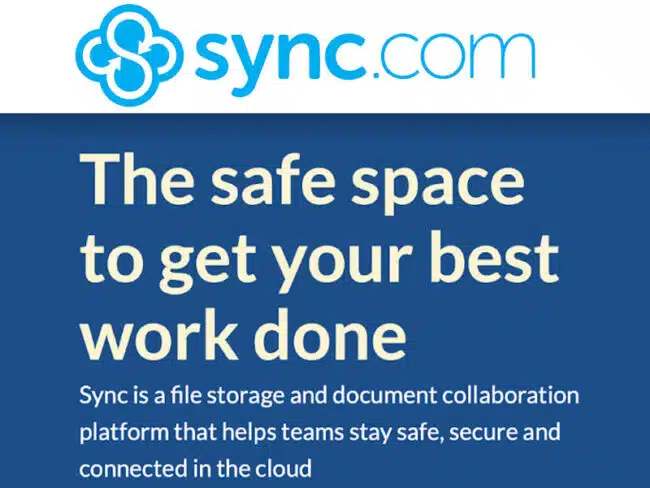
With over a decade in the industry, Sync.com has established itself as a leader in encrypted cloud storage. Based in Canada, this service lives up to its name by offering seamless file syncing alongside robust security for both personal and business users.
Sync distinguishes itself with a rich array of team-oriented features. Users can add comments to shared files, share folders with groups, edit Office documents straight from the Sync dashboard, and manage all users from one place.
Additional security options include password protection, download limits, and expiration dates for shared links.
For those wanting to test the waters, Sync.com offers a free tier with 5 GB of storage and basic sharing capabilities. Paid plans cater to various needs: the Solo Basic plan provides 2 TB for $8/month, while the Solo Professional plan offers 6 TB for $20/month.
Recognizing the needs of larger organizations, Sync.com also offers team-oriented plans, including an unlimited storage option at $15/month per user.
Furthermore, Sync stands out as the premier HIPAA-compliant cloud storage service, making it an ideal choice for businesses handling sensitive medical information.
Its file version history feature is unmatched in the industry, allowing businesses to restore file versions up to a year old, far surpassing the typical 30-day limit of most providers.
I found Sync’s desktop apps to be reasonably user-friendly. The app features a simple “sync” folder. Simply drag and drop files here to sync them to your account. The mobile apps are equally feature-rich, offering automatic syncing of photos and videos as they’re captured.
While the requirement for annual billing on lower-tier plans is not ideal, Sync.com does offer a 30-day money-back guarantee, so you can give it a shot without hesitation.
Sync Pros
- Robust collaborative features
- Smooth syncing across devices
- Restore files deleted a year ago
- Free tier with 5 GB of space
Sync Cons
- Apps could use some polish
- No live chat
pCloud

Founded in 2013, pCloud is a Swiss-based company that has carved out a niche in the secure cloud storage market.
Its free tier gets you 10 GB of storage. If you need more, be ready to commit to a yearly plan, as there’s no monthly billing. You can get 500 GB for $49.99 annually or 2 TB for $99.99 annually. Lifetime plans are also available at $199 for 500 GB, $399 for 2 TB, and $1190 for 10 TB.
Unlike many other cloud storage services, pCloud’s free or even paid plans don’t include zero-knowledge encryption. This feature is available as an add-on, priced at $49.99 annually or $150 for a lifetime.
Despite this pricing model, pCloud is highly regarded for its security, robust file sharing, and excellent media playback. Its built-in media player is arguably the most functional among cloud services, doubling as a media center for movies, shows, and music playlists.
Furthermore, pCloud’s offline mode allows access to shared files without an internet connection, while its rewind feature enables file recovery for up to 15 days on free accounts and 30 days on paid accounts.
pCloud is also the only cloud service on this list to offer a Linux client alongside Windows and macOS apps.
Besides the desktop apps, pCloud offers browser extensions for Brave, Edge, Chrome, Firefox, and Opera. These extensions enable the direct saving of web content to your pCloud account.
While pCloud’s 14-day money-back guarantee is shorter than the industry-standard 30 days, it still provides ample time to test the service.
pCloud Pros
- Free tier with 10 GB of space
- Only cloud service to offer a Linux client
- Useful built-in media player
- Browser extensions for saving web content
pCloud Cons
- Zero-knowledge encryption is not included as a standard.
- No monthly plan
iDrive
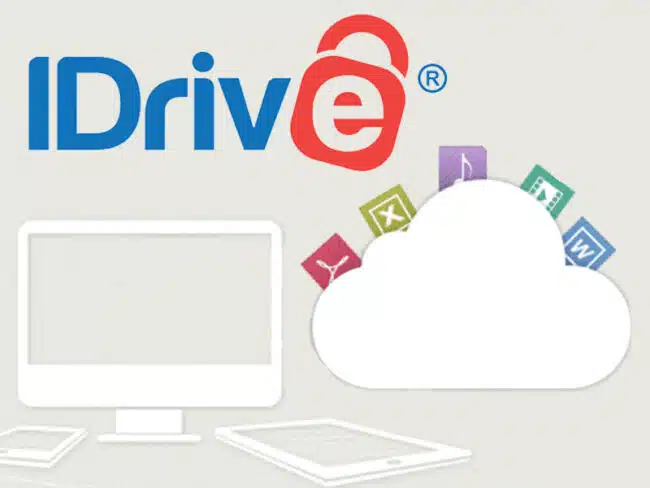
iDrive, founded in 2007 and based in the US, is primarily a cloud backup provider, but its hybrid approach earns it a place on our list.
While all data stored on iDrive’s servers enjoys end to end encryption, users must actively select the private encryption key option during account setup to enable client side encryption. This choice can’t be altered later.
The free tier offers 10 GB of storage, matching pCloud’s generosity. For those needing more space, the Mini plan provides 100 GB for $2.95 per year or 500 GB for $9.95. Personal plans scale up impressively, ranging from 5 TB at $9.95/month to a massive 100 TB at $99.95/month. Team and business plans are also available, offering up to 500 TB and 50 TB, respectively.
It’s especially useful for businesses as it can secure data from computers, Linux servers, and even specialized servers like MS SQL, VMware, and cloud services like Google Workspace and Microsoft Office 365 (as an add-on).
A standout feature is iDrive Express. The company ships you a physical hard drive, onto which you can transfer your files locally. You then return the drive to iDrive, which uploads your data directly to their servers. This service is complimentary once a year for personal users and thrice yearly for Team and Business subscribers, with additional requests available for $59.95.
While iDrive’s apps may lack the polish of some competitors, they compensate with functionality. The Windows app, for instance, allows users to clone and back up entire hard drives to the cloud.
As of writing this, iDrive is offering a promotional deal, where you can get 10 TB of cloud backup for $4.98 for the first year.
iDrive Pros
- Get 10 GB space with the free tier
- Backup data from Linux servers
- Transfer files locally via a hard drive.
- Zero-knowledge is available during setup
iDrive Cons
- Apps could use a revamp
- No live chat
FAQs | Encrypted Cloud Storage
It’s time to tackle some of the top questions about encrypted cloud storage.
No cloud storage is 100% safe. While encrypted cloud storage services like Proton Drive offer encrypted data security, no system can be entirely impenetrable. Still, these services are considerably safer than traditional unencrypted solutions due to their multiple layers of security that keep your data safe and limit breaches.
Proton Drive, Internxt, and NordLocker consistently rank among the most secure cloud storage options due to their military-grade encryption and numerous security measures.
Yes, cloud storage can be hacked, but encrypted services make it extremely challenging for hackers to access user data. Even if servers are beached, properly encrypted data would appear as gibberish without the encryption keys. However, individual user accounts can potentially be compromised in the absence of good security measures, like two-factor authentication.
Final Takeaway
Your search for the most secure encrypted cloud storage ends here.
Proton Drive is what I’d recommend to anyone transitioning from mainstream providers like Google Drive, iCloud, and Dropbox. It features an impressive blend of zero-knowledge encryption, ease of use, diverse storage options, and robust file versioning, all at a fair price.
NordLocker is a close contender, offering enhanced security even with its paid encryption add-on. Internxt’s lifetime plans are also an excellent choice for anyone ready to commit long-term.
Ultimately, any service from this list with zero-knowledge encryption will do wonders for your data security.
